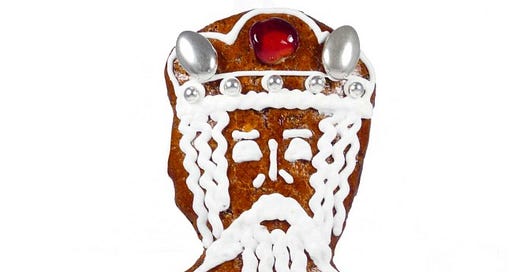Source Documents: German Scan
Note(s): This article appears in “Der Weg”, a German-language magazine founded in Buenos Aires, Argentina in the years immediately following the destruction of the Third Reich. See the links above for more information on the magazine and its contents.
For those not familiar with “Printenmann” [LINK].
Title: The Printen Man [de: Der Printenmann]
Author(s): Hans Steguweit
“Der Weg” Issue: Year 2, Issue 1 (January 1948)
Page(s): 19-20
Referenced Documents: None.
The Printen Man
Hans Steguweit
Anyone who cherishes the chewy pastry—its dough traditionally blended in Aachen monasteries from rye flour, dark blossom honey, anise seeds, syrup, and sugar—knows too those life-sized figures that appear for sale in the display cases of the artisanal bakers’ guild during the chill of Christmastide. These flat, baked Printen men gleam like polished ebony; their eyes are peeled almonds, as are their buttons, while dried sultanas and vibrant sugar icing crown the spicy, fragrant finery of their edible attire.
When such a Printen man is fastened with sky-blue or rosy silk ribbons to a smoothly planed board, it ever strikes the dreamy fifth-year students as a proper St. Nicholas gift for their bespectacled Latin professor. At the sight of this delectable and time-honored offering, the professor first furrows his brow in a gruff, stormy scowl, only to soften in the glow of tender youthful regard, letting the lesson’s poor marks slip from his mind. Later, with a sweet, indulgent smile, the somber magister has the baked figure borne home by a favored top student.
So it was with Professor Hummel, who wore, summer and winter alike, a felted frock coat speckled with egg yolk stains, his trouser legs dangling like corkscrews, his back not unlike a concave shaving mirror agleam.
Professor Hummel was a poor, lean soul; he had wedded late in life, and thus five little children—an uncanny throng—scampered over the carpet like rabbits. His hard-won wages melted each month like snow in an oven. Hummel’s sole delight was a fist-sized tortoiseshell snuffbox, which he filled weekly with snuff—though his fifth-year students swore it was coffee grounds.
Papa Hummel was just easing on his wrist warmers and hare-skin slippers, his pale wife winding a woolen scarf about his wheezing throat, when his five children pleaded with all their pre-Christmas zeal, yearning that today, December 6th, he’d bring home the usual Printen man from school.
Papa Hummel vowed it with misty eyes, tucked his leather satchel—brimming with mathematics, Caesar’s Gallic War, and Xenophon’s Anabasis—under his arm, and shuffled into the snow. His cane, tipped with a rubber stopper this time of year, steadied him; his nostrils puffed white clouds into the frost like a whale’s spout, and his beard shimmered with icy pearls.
Scarce had he stepped into the snugly warmed conference room of his humanistic gymnasium when he spied his younger colleagues encircling the director—Zeus, supreme among gods—murmuring with odd excitement. Plainly, Hummel was the last awaited. Then the broad-chested director’s speech boomed forth: the faculty must at last quash the rampant folly of the Printen man custom; such ways might suit girls’ schools or convent halls, but not a humanistic gymnasium which, in nigh sixty years, had bred justice ministers, prosecutors, and other erudite luminaries of world renown within its walls!
It scarce surprises that the staff, rigid at attention, gulped down their senior’s lesson without cough or protest, at times even underscoring, with indignant accord, the ban on such trifles and blatant student bribes.
Yet Professor Hummel, father to his five crawling babes, stood mute as a lamb, though his weathered heart bled within.
Soon after, from sixth grade to upper prima, the classrooms saw the decreed purge of these baked St. Nicholases; those guileless, edible saints crashed from lecterns, almonds, sultanas, and sugar icing strewn in scorn across the floors, with failing marks dealt vengefully in their wake.
Only in Hummel’s fifth-year class did peace prevail. This old man buried his ache and thanked his students for their gentle hearts. Dutifully, he had Caesar read aloud, rewarding their efforts this time with morsels of Printen, broken from the pastry man’s board with quivering fingers—sighing as he doled out portions, large or small, by each pupil’s merit. Today, even the weakest seemed passable Latinists in his eyes, and none of these blessed souls still claimed his precious snuff was coffee grounds. When a poor scholarship boy shied from taking his share, having paid no coin, Papa Hummel, eyes damp, pressed another piece upon him: “Take it, lad, take it, for you are poor—I know that sting!”
The boy accepted it.
By one o’clock, he stowed at least the bare wooden board beneath his coat—wood was dear, and winter bitter. Yet even this a student begged off him for a fretsaw’s craft.
At home, though, tears streamed thick down Papa Hummel’s frosty cheeks as the hopeful clamor of his children rang from the room. He soothed the sorely disappointed: “Children, times have turned; there are no more Printen men—the teachers fear them now!” And with that, the doorbell chimed. Mama Hummel opened it, her eyes gaunt: there stood the whole fifth-year class, each lad clutching his Caesar in one hand, his Printen morsel in the other. Politely, they doffed their bright caps, tromped in with wet snow clods—not to the professor, no, but to the children, aye, the children—for they had learned the pang of want.
Perhaps Hummel shaped new lights in his Latin hour that day—not justice ministers, prosecutors, or grand scholars of global fame, but at least bold young lads, German citizens of honest heart.




